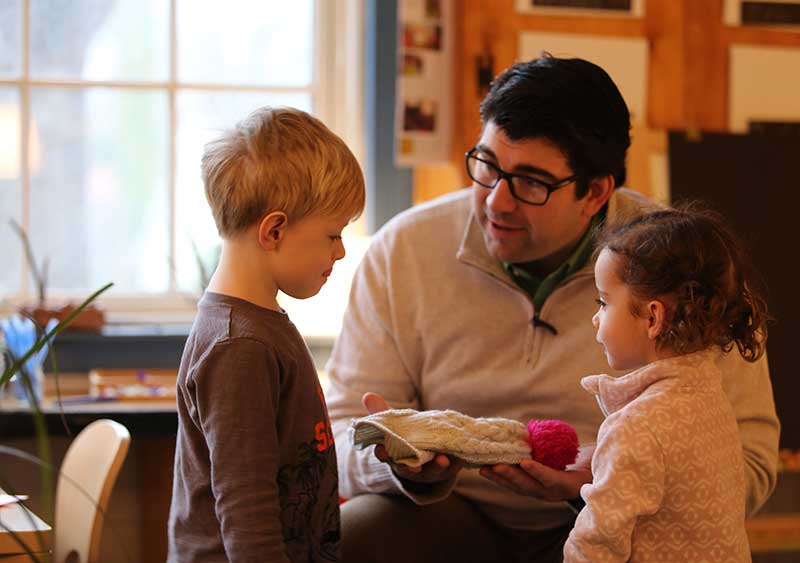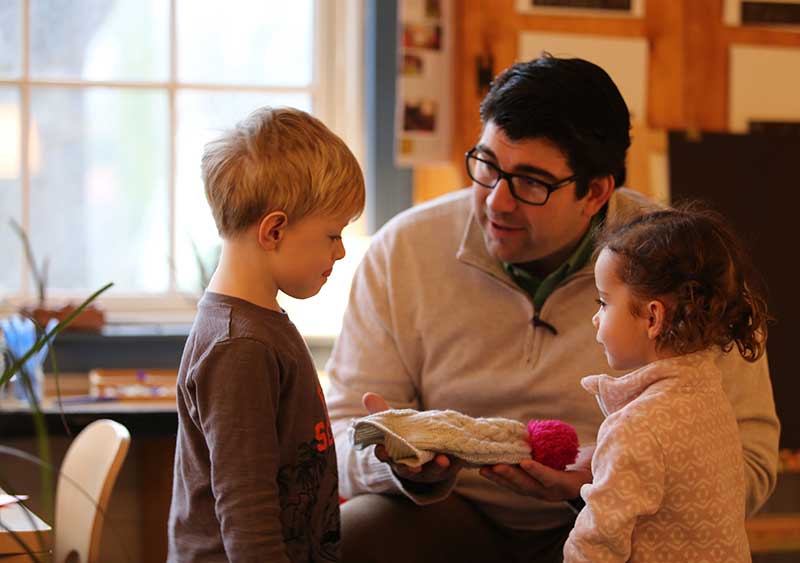Guiding Preschool, Prekindergarten, and Kindergarten Students in Reactive Conflict Resolution

Preschool Reactive Conflict Resolution
Last week we examined proactive conflict resolution, strategies which help children develop problem-solving skills. We thought about how this technique of conflict resolution prepares and empowers children to become active problem solvers.
This week we turn to another thread of this conversation: reactive, or “in-the-moment,” conflict resolution.
As parents and educators of preschoolers, prekindergarteners, and kindergarteners, we all know that children experience frustration and conflict. Whether it be a disagreement about a toy with a peer, anger about the outcome of a situation, or an attempt at play which went inexplicably wrong, young children find themselves in situations of conflict.
Step-by-Step Process for Preschool Reactive Conflict Resolution
There are some tools which I use that can help children navigate their frustrations in the moment. My goal for conflict resolution is that each person involved feels respected and valued, and that the solution to the conflict is something which works for everyone (including me). Here are some steps in my process:
- Make sure that everyone is safe. This is the number one priority.
- Remain calm and slow down: a deep breath helps.
- Acknowledge emotions: phrases like “I can see you are frustrated” and “that made you angry” validate what children are feeling. Remember, the goal is to help children work through their very real emotions.
- Once children are in a place where they are able to talk and move towards a solution, I set up structure for the conversation: “James, will you tell us what happened? Lucille and I will listen, and then Lucille will have a chance to tell us what happened.” Children crave structure. I have also found that this reduces the “he said, she said” urgency often associated with conflict resolution.
- I repeat what has been said, and summarize the conflict. “Let me make sure I understand: James wanted a turn with the Legos, and Lucille was not done playing with them yet.”
- I offer a chance for children to come up with solutions. “What do you think we could do to solve this problem?” At this point, I have to read the room. Sometimes children are able to generate potential solutions themselves, and when they do I go back to summarizing and repeating, making sure that everyone hears the same thing. Sometimes a gentle suggestion from an adult is needed to get the conversation going. Sometimes this takes time, and it always takes patience.
The final step in these situations goes back to the concept of value. I feel that it is imperative that everyone involved be invested in the solution. I look at each child, and ask them if they agree to the solution, knowing that they have the right to say no. If we are in agreement we can all move on with our day. If we are not, then we slow down and go back to the process in order to find a solution which works for everyone, acknowledging the respect which we have for each other.
Stay tuned next week for more tools and ideas from our Moorestown Preschool program.
Beginnings at MFS is the Moorestown Friends School Early Childhood Program (Preschool, Prekindergarten, and Kindergarten). The Beginnings Blog is intended as a helpful tool for parents and guardians of young children, examining important ways in which children find meaning, in their lives and in their education.
Author Garrett McVaugh is the Beginnings at MFS Half-Day Preschool Teacher. Along with his Teaching Assistant Pauline Williams, he guides some of the youngest MFS students through their first year of school. A graduate of Haverford College, Garrett has been an early childhood educator for over a decade. Prior to MFS, he was a teacher at Preschool of the Arts in Madison, WI. Prior to living in Wisconsin, Garrett spent eight years teaching at St. John’s Episcopal Preschool in Washington, DC.
Schedule a Visit with Us
Learn more by a visit in person and meet with one of our excellent Early Childhood Program teachers.

